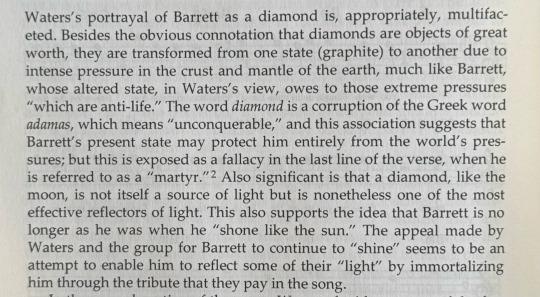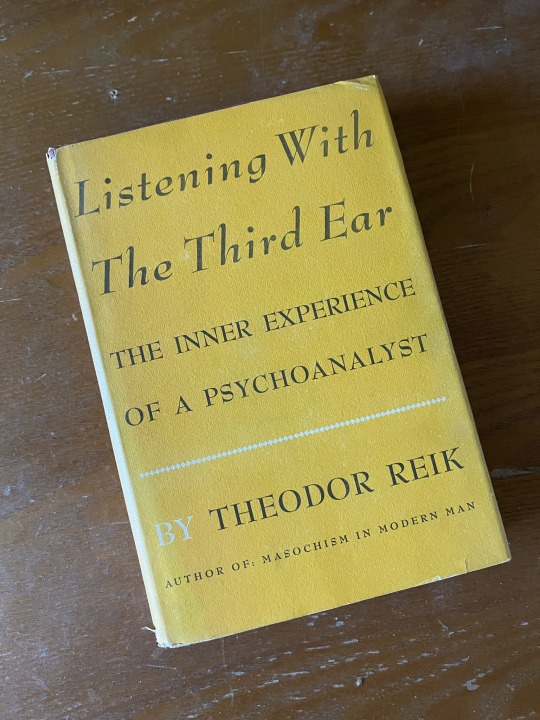#freudian psychoanalysis
Note
Origin of the phrase "cryptid?"
That’s just the name of the very first known cryptid, the “cryptid.” It lived in crypts, farmed bitcoins, and had a very small, weak superego. This was rare back in the 1600s but now it describes most business school graduates.
190 notes
·
View notes
Text
Forgive my poor citations for this one :[ I’m currently sitting in the nicest amphitheater I've ever been in getting ready to sing a holiday concert! Feeling a little nervous, a little silly, here’s some Freudian Analysis:
Freudian Defenses in The Main Character
“The Main Character” by Will Wood is a satirical song from the perspective of a modern self-obsessed, trope-defined egomaniac. This character is meant to embody someone who speaks without the use of their Freudian superego (see: “Look in the sky, it’s a bird! It’s a plane! No, it’s superego!” as the character watches their superego leave them behind). This speaker utilizes several of the Freudian defense mechanisms to justify their egoic actions and attitudes towards other people. One such example is the speaker’s use of regression. When speaking about being disliked, the narrator becomes incredibly uncomfortable, saying, “Don’t come at me; I’m the main character, and you have to like me.” After this, the narrator regresses into childish villain personas to hide from their actions. One such example is Snidely Whiplash, the villain from the cartoon Rocky and Bulwinkle. This villain is a caricature of evil and is known for tying people to train tracks and twirling his mustache. The speaker is hiding behind this immature cardboard character to hide from the more severe accusations they are being confronted by. Some other such villains are Boris Badenov and “Daleks in high collars,” more foolish villain types.
Another favorite defense mechanism of our narrator is rationalization. The chorus repeats the lines, “So God forbid I’m seen just as an average human being… Don’t come at me; I’m the main character, and you have to like me.” The word “like” here can refer to both “likes” on social media and liking someone as a genuine person. Our narrator easily conflates the two. The phrase “main character energy” is famous on a lot of social media platforms as a way to announce one’s self-importance in one’s life. You are living your life; ergo, you are the main character in your own story. The narrator in this song does not have the superego to recognize that they are not the main character in everyone else’s life, and so lives deluded into thinking that they are. This is exemplified in verse two, stating, “I loot plot armor from NPC’s; Well, they are to me. Trite tropes, traits, traumas, trinkets, and treats; it’s all XP.” To translate some of the slang here, the speaker is calling other people’ Non-Playable Characters’ and deeming them worthless to his endeavors. Plot armor is a film device that describes protagonists who have to stay alive, even in dangerous situations, for the sake of the story. Stripping someone of their plot armor means that they would be expendable to the narrator if they need to gain the ‘XP’ or experience. Because the narrator believes themselves to be the main character of this larger story, mistreating other people is acceptable for the sake of “the plot.”
The final commonly used defense mechanism is denial. The narrator can comfortably live this lifestyle as long as they don’t wake up to the reality that other people are more relevant than themself. The post bridge says, “The court fool got the guillotine, the witches the stake, you the dopamine. And Siemens made the Zyklon B, but we all still get the flu.” These lines all refer to some kind of scapegoat, different groups of people who were blamed for the sake of denying more significant issues. The court fool is executed as an example, witches are burned to defend the church and deny other ideas, and a person takes dopamine to deny their depression. This narrator is a self-aggrandizing, deluded narcissist and can only continue to be this way with the use of defense mechanisms.
(Word Count: 590)
“Will Wood – the Main Character.” Genius, 29 July 2022, genius.com/Will-wood-the-main-character-lyrics.
#will wood#writeblr#writing#Freudian psychoanalysis#in case i make it#song analysis#the main character
9 notes
·
View notes
Text
I kinda feel like plotting the murder of your mother with your estranged brother is a very she/her thing to do and bedding your mother after having unknowingly stricken down your father in a quarrel is more for he/hims. don’t ask me why tho idk...
316 notes
·
View notes
Text

from an analysis of SOYCD in Roger Waters and Pink Floyd: The Concept Albums by Phil Rose
#this book goes into DETAIL#the symbolism of chord progressions and everything#there’s a whole chapter on post-freudian psychoanalysis of the wall#syd barrett#pink floyd
22 notes
·
View notes
Text
One of Lacan’s most oft-repeated formulas is: ‘man’s desire is the desire of the Other’. (Seminar 11). This can be understood in many complementary ways, of which the following are the most important.
One of Lacan’s most oft-repeated formulas is: ‘man’s desire is the desire of the Other’. (Seminar 11). This can be understood in many complementary ways, of which the following are the most important.
1. Desire is essentially ‘desire of the Other’s desire’, which means both desire to be the object of another’s desire, and desire for recognition by another. Lacan takes this idea from Hegel, via Kojève, who states:
Desire is human only if the one desires, not the body, but the Desire of the other...that is to say, if he wants to be ‘desired’ or ‘loved’, or, rather, ‘recognised’ in his human value.... In other words, all human, anthropogenetic Desire...is, finally, a function of the desire for ‘recognition’.
Kojève, 1947:6)
Kojève goes on to argue (still following Hegel) that in order to achieve the desired recognition, the subject must risk his own life in a struggle for pure prestige. That desire is essentially desire to be the object of another’s desire is clearly illustrated in the first ‘time’ of the Oedipus complex, when the subject desires to be the phallus for the mother.
Evans, Dylan. An Introductory Dictionary of Lacanian Psychoanalysis. Routledge. 1996.
#lacan#psychoanalysis#unconscious#jouissance#lacanian real#freud#lacan unconscious#lacan object petit a desire#real symbolic imaginary#objet petit a#psychoanalyst#parletre#lacanian discourse#freudian drives#speaking body#freudian unconscious#speaking being#psychoanalytic#symptom#jacques alain miller#kojeve#hegel#desire#desire of the other
66 notes
·
View notes
Text
The lines of influence which psychoanalysis will exercise over sexual politics are set; generations of practitioners will follow, reputable or ridiculous. Yet more effective even than penis envy is the school's tendency toward a pseudoscientific unification of the cultural definition of masculinity and femininity with the genetic reality of male and female. Dressing the thing up in jargon—"passivity," "low libido," "masochism," "narcissism," "undeveloped super ego"—one gives the old myth of feminine "nature" a new respectability. Now it can be said scientifically that women are inherently subservient, and males dominant, more strongly sexed and therefore entitled to sexually subjugate the female, who enjoys her oppression and deserves it, for she is by her very nature, vain, stupid, and hardly better than barbarian, if she is human at all. Once this bigotry has acquired the cachet of science, the counterrevolution may proceed pretty smoothly. Sex, like race, is something one cannot really change. It is a sign of a rather superior female to wish herself out of such a case, seeing and aspiring to the virtues of the ruling group. But it is futile to hope to escape one's birth caste. Aspiration on the part of the truly incapacitated only forbodes frustration. And, after all, psychoanalysis promised fulfilment in passivity and masochism, and greater fulfillment, indeed, the very meaning of woman's life lay in reproduction, and there alone. Then too, in venal hands, psychoanalysis could not only discredit the revolution and turn it back, but give work, make money, sell itself and consumerism as well.
-Kate Millett, Sexual Politics
#kate millett#freudianism#psychoanalysis#sex roles#masculinity and femininity#gender entrenchment#male scientific theories#antifeminism
15 notes
·
View notes
Text
Hate what the 20th century did to hamlet…
#I’ll save you my beloved#hamlet#give it a break !!! plz I beg#why would they do this to my boy#Freudian psychoanalysis and individualism when I catch you…
7 notes
·
View notes
Note
I don’t read jjk but I do see the leaked panels ppl share and. I think there was another guy who possessed Megumis sister and was in love with Sukuna? And they fought while Sukuna was in Megumis body and the guy was in Megumis sisters body…

13 notes
·
View notes
Text
(miranda priestly voice) soup for jiang yanli's main quality? groundbreaking
#hewwo#🙄 but what did i ever expect from fujos#not just with her but with these fandoms in general it's always the lowest hanging fruit#get creative. add some freudian psychoanalysis
10 notes
·
View notes
Text
not to be a freud advocate or anything but part of these hot takes about how much you all hate him seem kind of....... uninformed to say the least.. yes he made up a lot of bullshit (it's entertaining though) but pleaseee please i'm begging you to read the essay on the uncanny or civilization and its discontents. also it's kind of concerning how psychology and cultural studies are so desperate to adopt these rigorous scientifical standards and to dismiss how much psychoanalysis actually shaped the humanities during the last century. i'd rather have a fractured ego and an evil subconscious than be the rational subject of cognitive behavioural therapy or self-help books
#again i hope no one reads this as a reactionary freudian take#it's just.. queer theory for instance would have been impossible without psychoanalysis#philosophy/theory tag#oh and don't even get me started with the horror genre and its links to psychoanalysis#🦇
23 notes
·
View notes
Text
I'm still absolutely obsessed with this academic article (academic!! article!!) I read recently that posited that Arya and Gendry's sex scene detrimentally objectified Arya through the use of the male gaze where their only evidence was that--
that Gendry--
that he--
that he LOOKED at her
#it's been a month since I've read it and I'm STILL howling about it#thank god a grad student wrote it. if an actual prof was that stupid I don't think I could have taken it#I've never seen someone so wildly and woefully misinterpret gaze theory#all while unironically using grade A freudian psychoanalysis as their theoretical lens#whoever peer reviewed that should be fucking fired but also. GOD was it funny#I want to frame it and keep it for comedy purposes#no I will not link it to anyone because it was a shit article that should not be read#gendrya#got
37 notes
·
View notes
Text
my art application for an art organization in my university.
—CAER

#inner child#children#psychology#abuse#daddy issues#mommy issues#therapy#psychotherapy#psychiatry#psychoanalytic#psychoanalysis#psychodynamic#freudian#everything everywhere all at once#depression#mental health#self care#self love#art#black out poetry#elmo
22 notes
·
View notes
Text
In contemporary treatments of depression, [t]he interior life of the sufferer is left unexamined … Depression … is conceived of as a biological problem like a bacterial infection, which requires a specific biological remedy.
In contemporary treatments of depression,[t]he interior life of the sufferer is left unexamined … Depression … is conceived of as a biological problem like a bacterial infection, which requires a specific biological remedy. Sufferers have to be returned to their former productive and happy states … the exploration of human interiority is being replaced with a fixed idea of mental hygiene.
Leader, D. (2008) The New Black. London: Penguin.
#lacan#psychoanalysis#unconscious#jouissance#lacanian real#freud#lacan unconscious#lacan object petit a desire#real symbolic imaginary#objet petit a#psychoanalyst#parletre#lacanian discourse#freudian drives#speaking body#freudian unconscious#speaking being#psychoanalytic#symptom#jacques alain miller#depression#anxiety#angst#dread#body
37 notes
·
View notes
Text
I’m coming up to the part of the research in auth personality where freud is unavoidable
#the authoritarian personality#he was the bitch who made up id ego and superego right#I don’t know to what degree freudian psychoanalysis will be in this research#but they thanked freud in the acknowledgements so. i guess we will see
9 notes
·
View notes
Text

“A patient is always surprised when he is told something that unconsciously he already knows. This follows from our designation of surprise as the reaction to the fulfillment of an unconscious expectation. He will take in what was formerly known to him and has only been alienated, as if it were something new, and will repel it. We may now understand the effect, which often does not appear until later, of such a surprising communication, if we recognize it as a kind of psychical shock that it takes time to master.
We shall not be put off by the fact that the patient experiences these surprises within his ego, although he thinks that he is well acquainted with his own inner life. It will seem strange to us that the analyst, too, who has such wide experience, is largely dependent upon receiving such knowledge from unknown powers of the ego, and upon listening for the stirrings within him in tracking the hidden meaning of psychical phenomena. Where the analyst's idea penetrates to the profoundest depths of the other's inner life, it may be recognized as the offspring of what is repressed in the analyst and appears to him as something alien. In short, to sum up the matter: The most vital knowledge obtained by the analyst of the unconscious-repressed is, for him too, a surprise. It is true that this surprise reaction will lose intensity as the analyst gains insight and deeper psychological knowledge. There may come a time when it does not appear at all. But at least in the early years of an analyst's work it remains as a sure signal that his own unconscious is involved in the recognition of unconscious relations. It is not logical reflection and theoretical learning that constitute the core of the preconscious and unconscious knowledge, so helpful to the psychologist in later years in recognizing repressed processes, but the memory-traces of the surprise he has experienced. If, in our analyses of mental effects, we can so often infer hidden, unconscious motives, the inference is of value, not so much as a logical operation but rather as the outcome of repeated insight into the mind that surprised the analyst at first.
We mistrust psychologists who declare that they experience no such surprises, that the unconscious of those whom they study is immediately transparent to them and easy to penetrate. There may be psychoanalysts of such a nature. They are, so to speak, professional experts in the depths of the human soul. The netherworld is their oyster. The psychologist "who is surprised" then stands consciously opposed to those for whom there are no surprises left in the inner life. If these gentlemen boast that they find it easy "to read the other person," that the unconscious lies before them like an open book, then they do not know how to read it. The wonders of the inner reality are hidden from their sight. I know that there are many psychoanalysts who shrink from what is astonishing and set up a defense against what is sur prising in the psychological field, and try to protect themselves against it. They put up a barrier of theoretical learning, to parry and intercept it. But the best of our profession, the most valuable of our art and craft, have learned to appreciate the heuristic value of surprising ideas emerging from the unconscious, and gladly welcome them. (You shall be welcome whenever you come.)
The surprise that is felt when the unconscious meaning of individual phenomena is recognized, when the latent significance of individual symptoms, dreams, strange reactions, is understood, may increase at a later stage, toward the end of the process of analysis. When we survey the development of a neurosis or a special character, our surprise does not diminish when we recognize how the co-operation or confict of particular impulses has produced just this emotional result, how inevitably and yet how naturally just this type of character arose in the play of psychical forces. And so, when his task is accomplished, the psychologist is struck with amazement as he surveys what he has seen of the dynamic and economic conditions of the inner processes. His incipient understanding of the methods by which our mental machinery works will not lessen his amazement, but rather increase it.” (pages 245 - 247)
#reik#theodor reik#psychoanalysis#psychoanalytic#third ear#psychology#freud#freudian#therapy#surprise#inner experience#lay psychoanalysis#listening#dreams
4 notes
·
View notes
Text
Ego, Id, and Superego in NBC's Hannibal
youtube
Great analysis that I've found recently on youtube 👆🏼 on the as always, compellingly disturbing Dr Lecter.
By exploring the concepts of Freudian psychoanalysis, it provides greater understanding for characters like Alana Bloom (superego) or Dr Bedelia du Maurier (ego). It portrays The Stag Man (Wendigo), symbolic apparition seen by Will Graham as the Freudian id.
Through the analysis we can find out what these specific characters and symbols mean in different stages of the show for Hannibal and his psyche.
Extremely interesting and thought provoking. Definitely deserves more views and likes :)
#psychology#psychoanalyzing#psychoanalysis#psychoanalytic#hannibal and will#hannibal the cannibal#hannibal and bedelia#hannibal lecter#hannibal#bedelia du maurier#alana bloom#will graham#thomas harris#red dragon#sigmund freud#freudian#freud#freudian psychology#psychiatry#the stag man#wendigo#symbolism#Youtube
5 notes
·
View notes